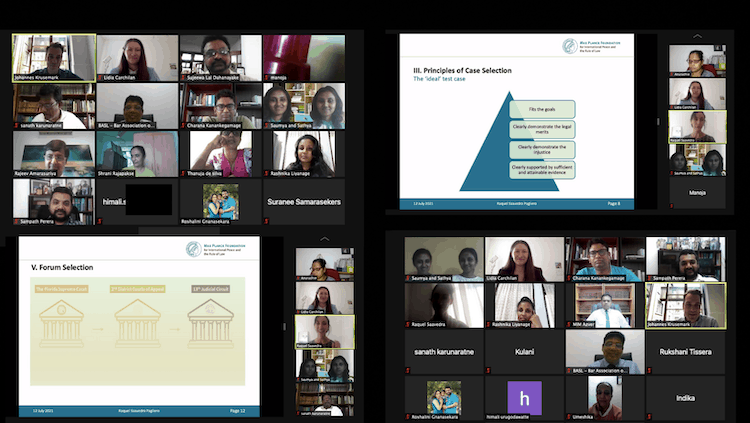First seminar to be co-delivered by the Foundation and Senior Lawyers of Sri Lanka focusing on select economic, social, and cultural rights
From 12 to 15 July 2021, the Max Planck Foundation held a seminar for lawyers in the Western Province of Sri Lanka. The particularity of this event is that it had been co-delivered by Foundation research fellows together with two senior lawyers practicing law in Sri Lanka, trained on the topic within the Training-of-Trainers workshop programme that took place in December 2020 and February 2021, respectively. The event was held via videoconference over the course of four days. The Secretary of the Bar Association of Sri Lanka, Rajeev T. Amarasuriya, and one of the Foundation’s Managing Directors, Johannes Krusemark, held the opening address. The seminar started with a round of introductions, followed by two foundational sessions that laid down the sources of international law, the main principles applied in international human rights law and the elements of developing a strategic litigation case.
The second day marked the start of sessions tackling the select substantive rights. The first session, delivered by senior lawyer, Himali S. Urugodawatte, was on the right to just and favourable conditions of work. This session sparked interest amongst participants especially in the context of the interaction of labour rights in the context of a pandemic. This was followed by a session on the right to social security, that highlighted the risks and contingencies that fall under the coverage of this right and underscored the connection between labour rights and the right to social security. The second day concluded with a session on rights associated with land, co-delivered by senior lawyer, Sujeewa Lal Dahanayke and Foundation research fellows.
The third-day discussions to continue around economic, social, and cultural rights, this time focusing on the right to participate in cultural life under the International Covenant on Economic, Social, and Cultural Rights, with an emphasis on language rights in Sri Lanka. The day continued with a session on the right to housing, that was co-presented by Sujeewa Lal Dahanayke and Foundation research fellows.
The final day was dedicated to a case study analysis and group exercises centring around a case that engaged all the rights discussed throughout the seminar and the components of strategic litigation. Participants worked in groups and presented their findings with the relevant citings of international and domestic legislation. This allowed for an overarching contextualisation of all the rights discussed over the course of the week and raised various legal strategies to be considered when bringing economic, social, and cultural rights to court.
The seminar was closed by an address from the Finance Manager of the Bar Association of Sri Lanka, Prakalathan Thuraisingam, and the Foundation who encouraged participants to apply their newly acquired knowledge in their practices and congratulated them on their participation. Subsequent seminars on select economic, social, and cultural rights for lawyers from other Sri Lankan provinces are planned to take place later this year. This seminar has been developed as part of the project “Advancing Institutional Capacity in the Sri Lankan Justice System” funded by the German Federal Foreign Office.

